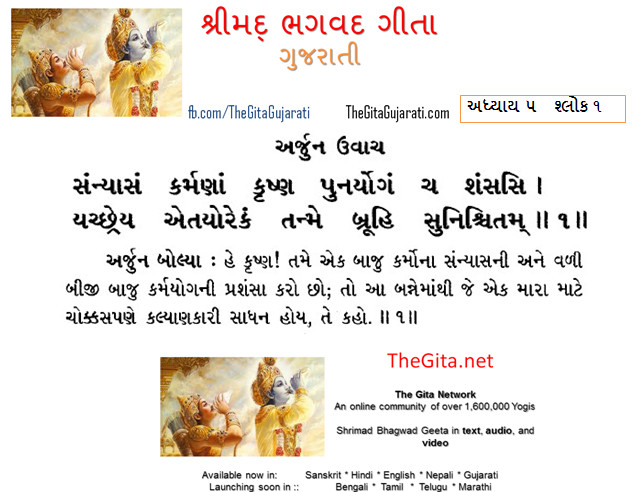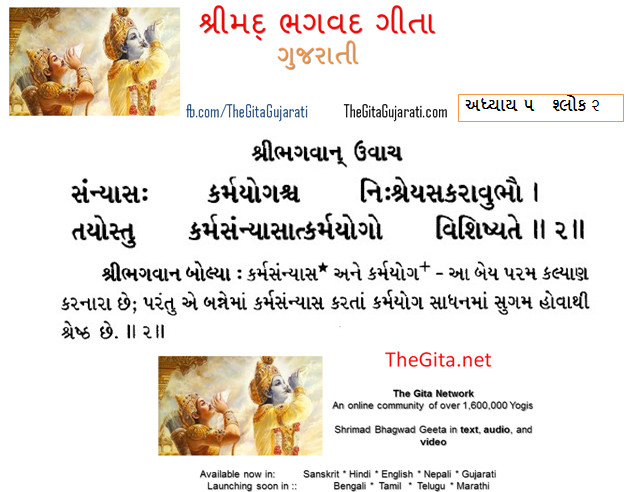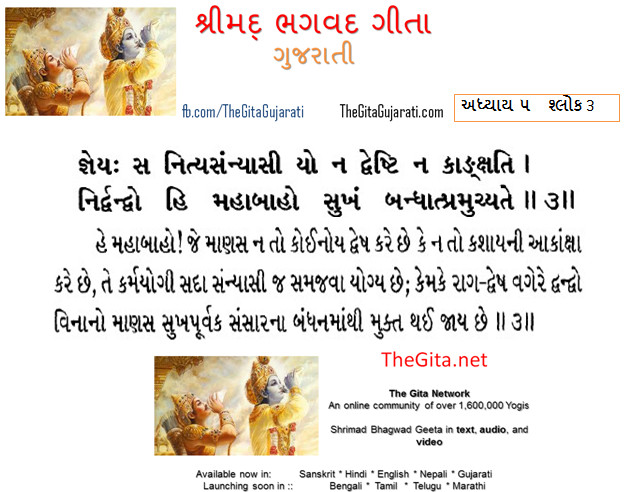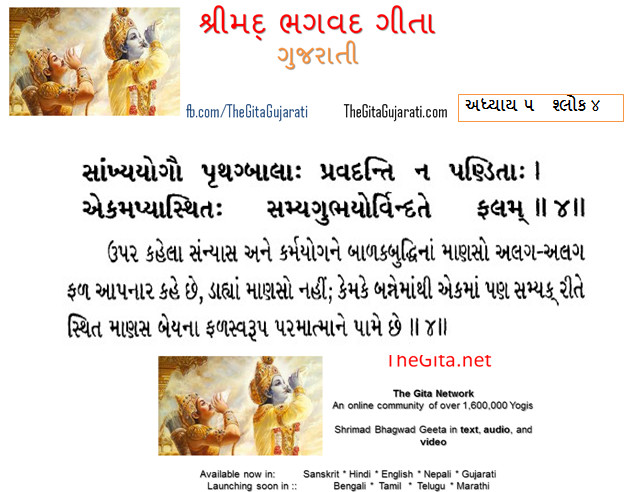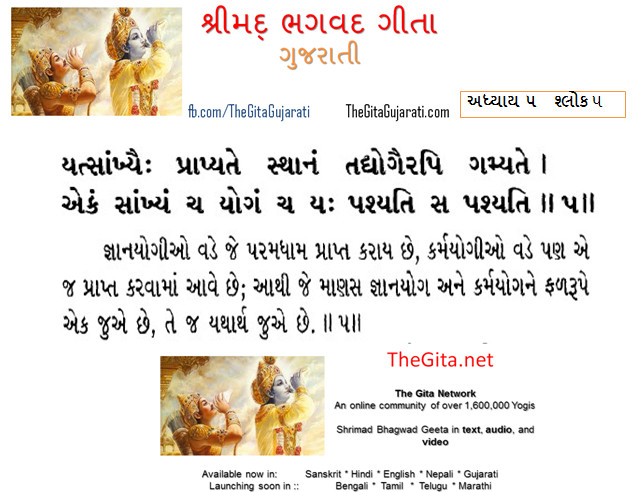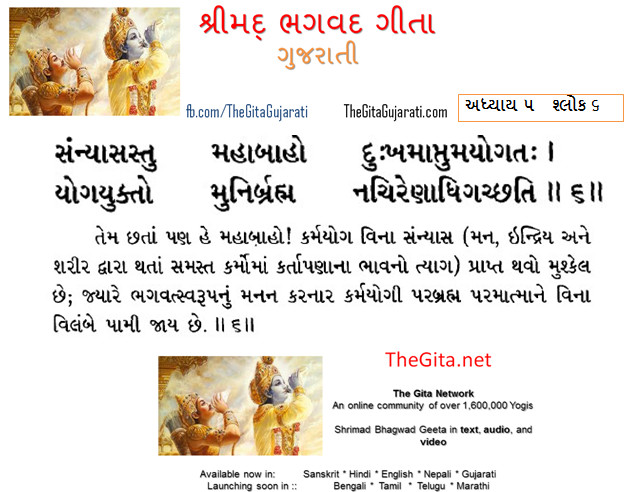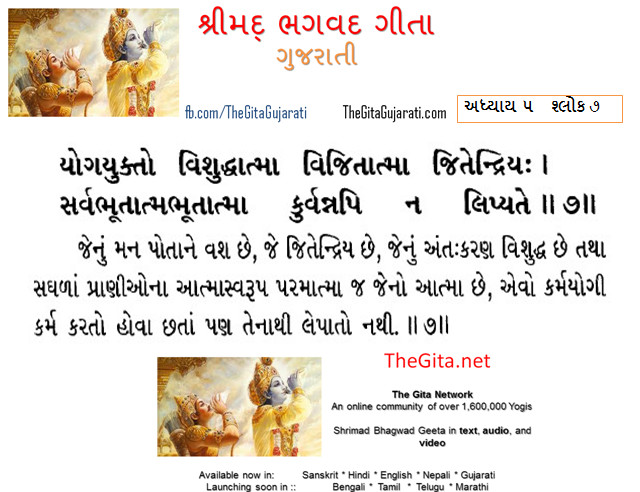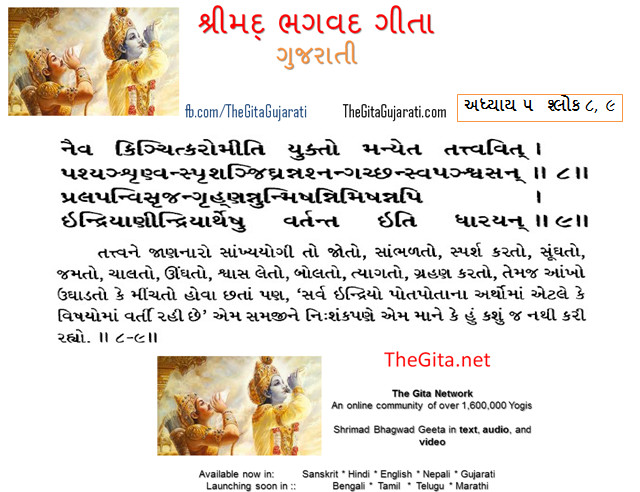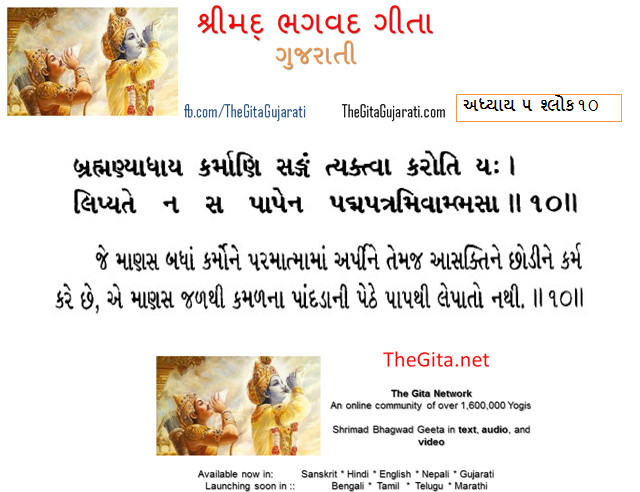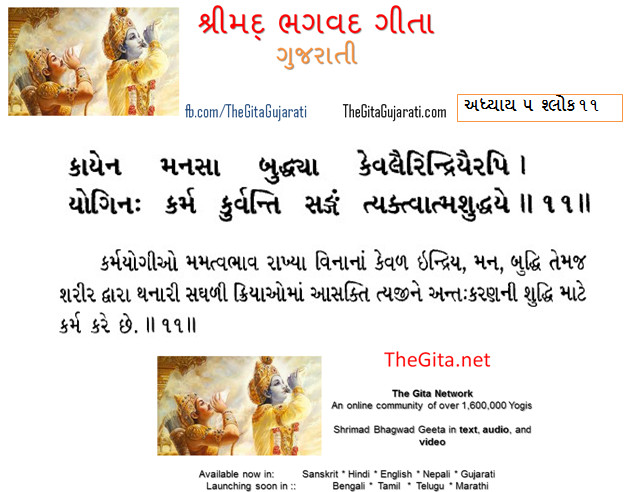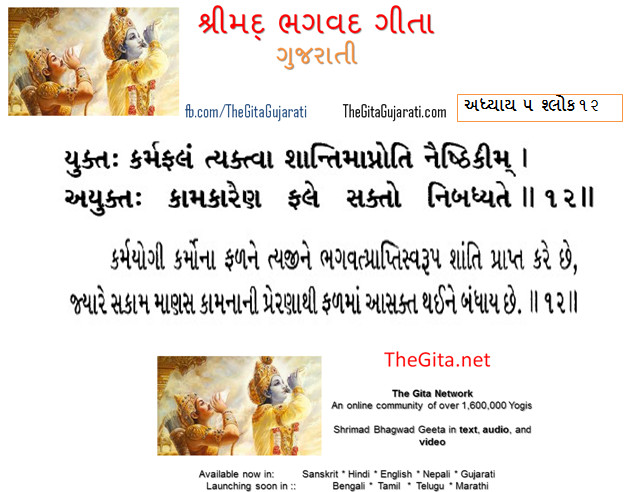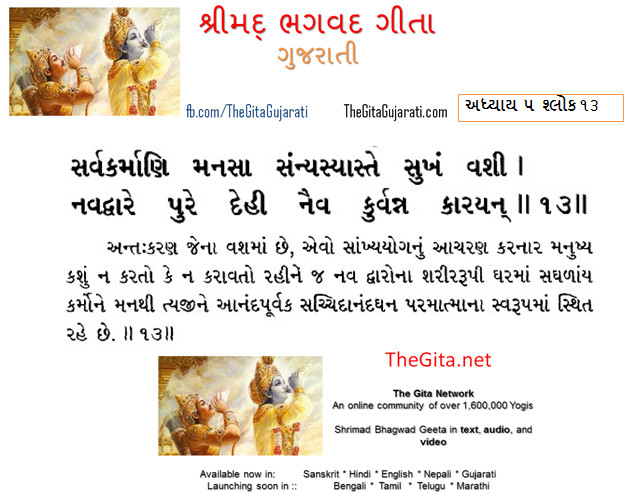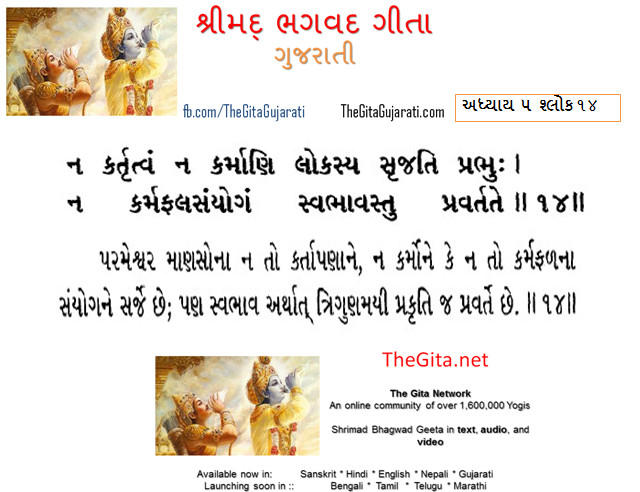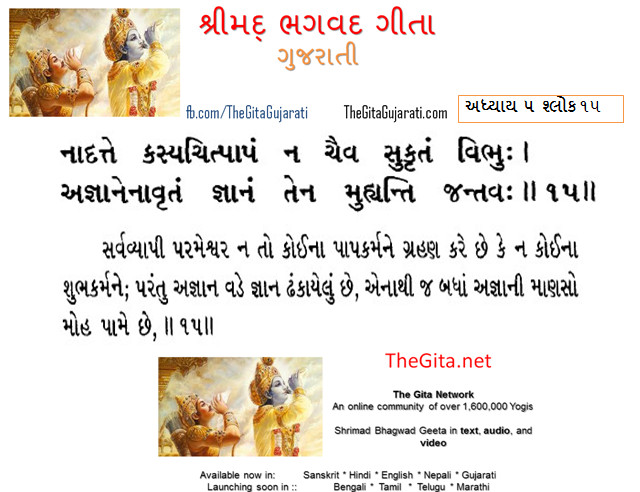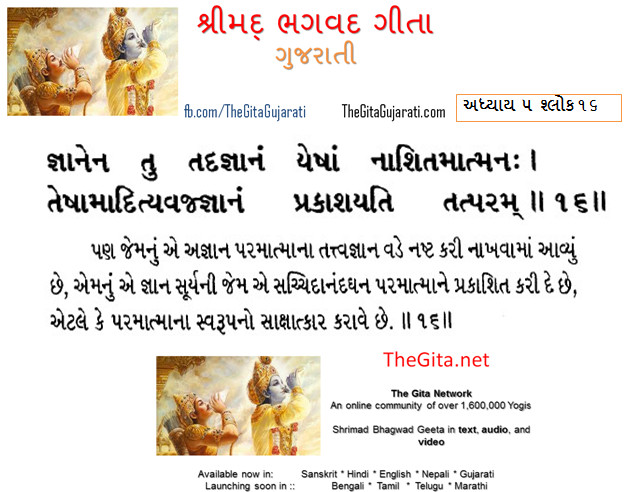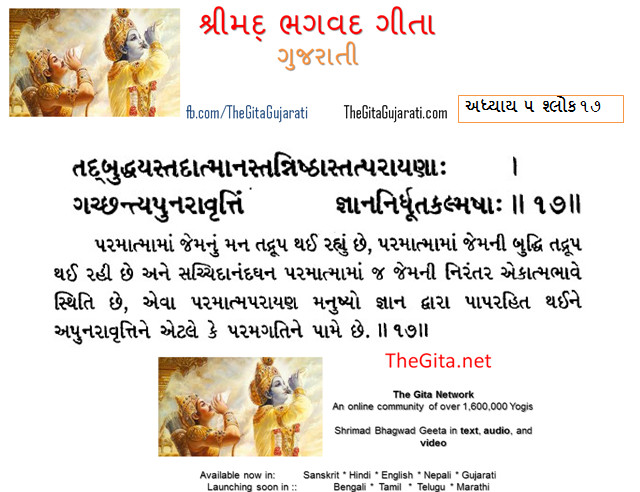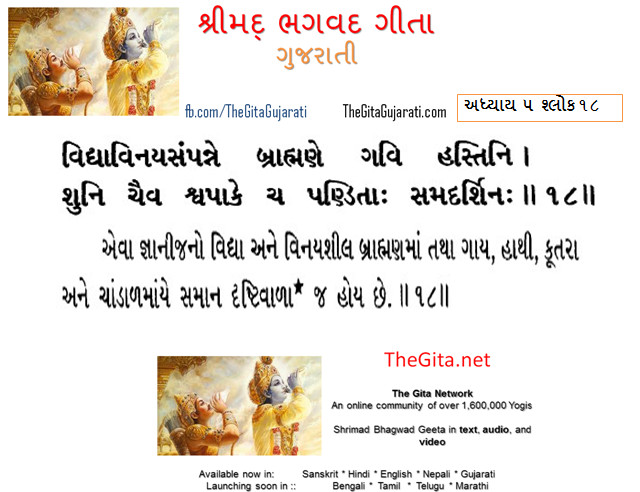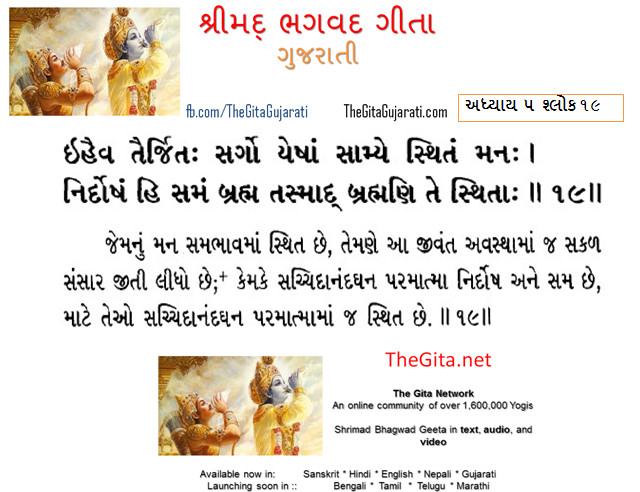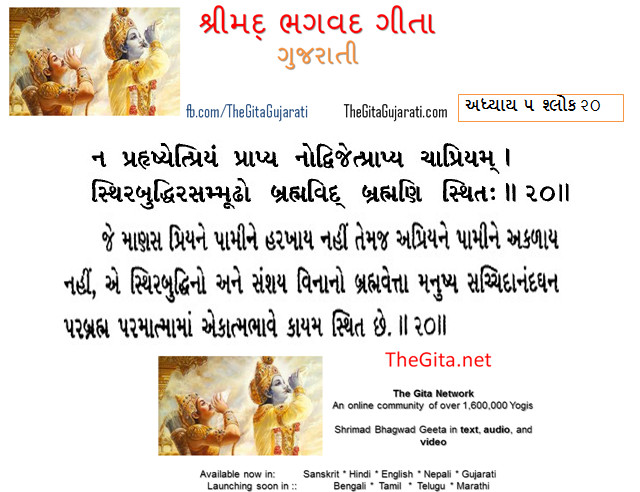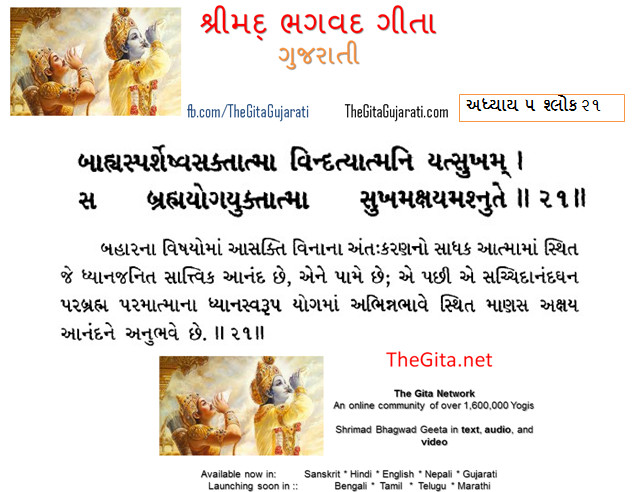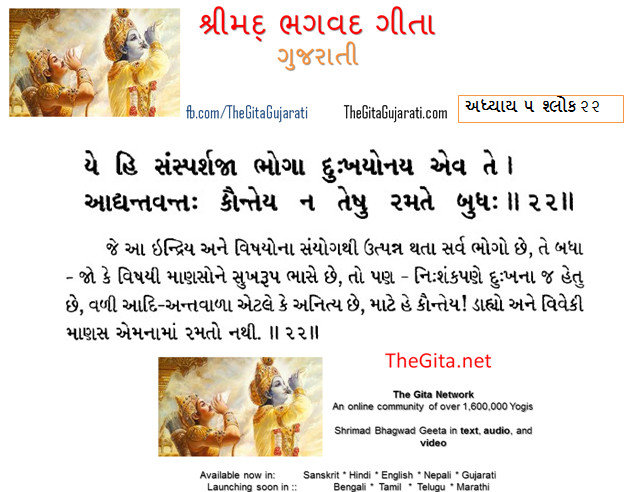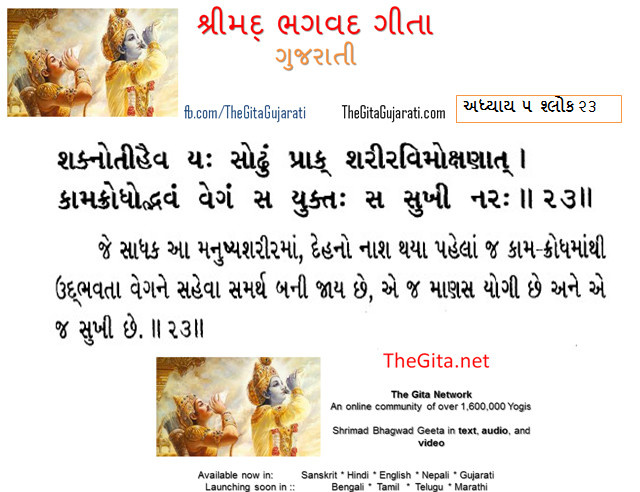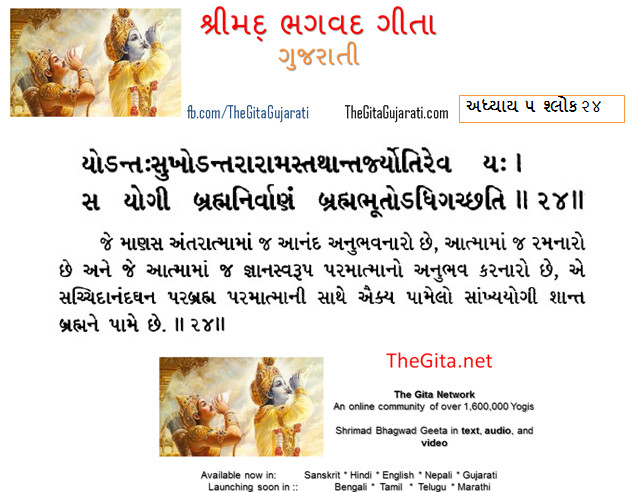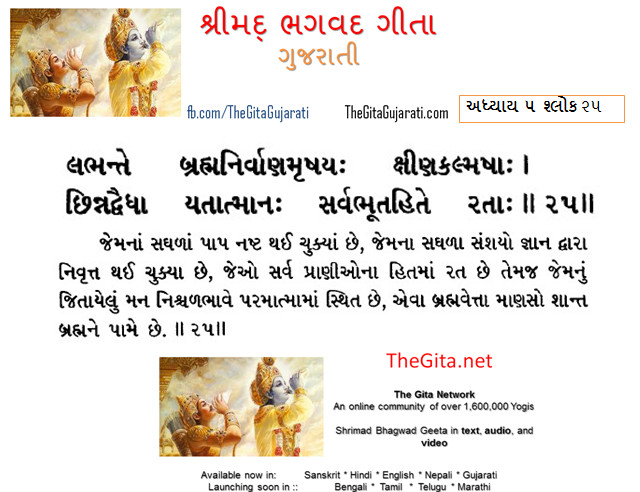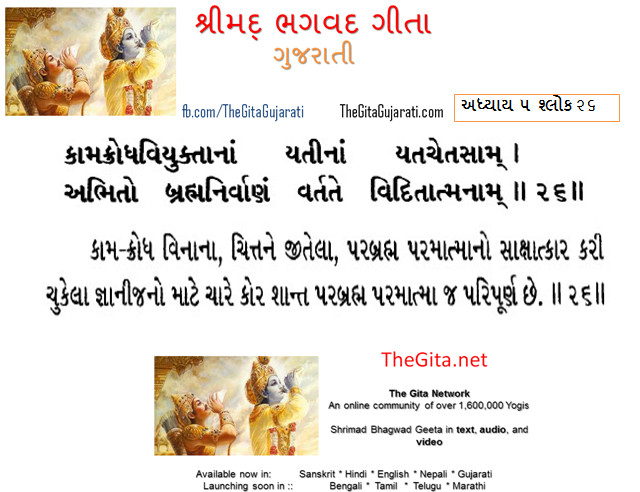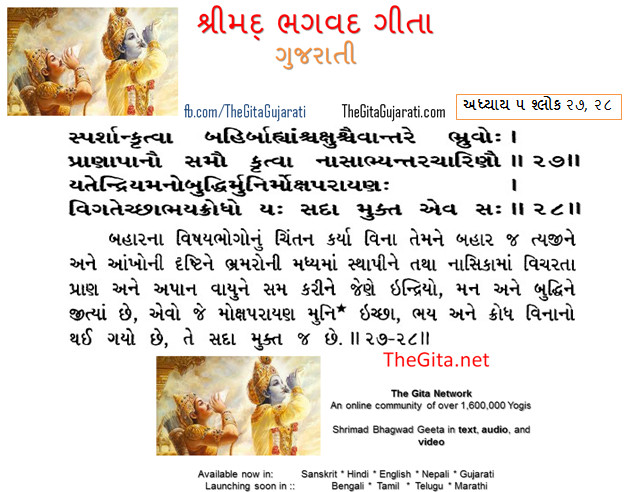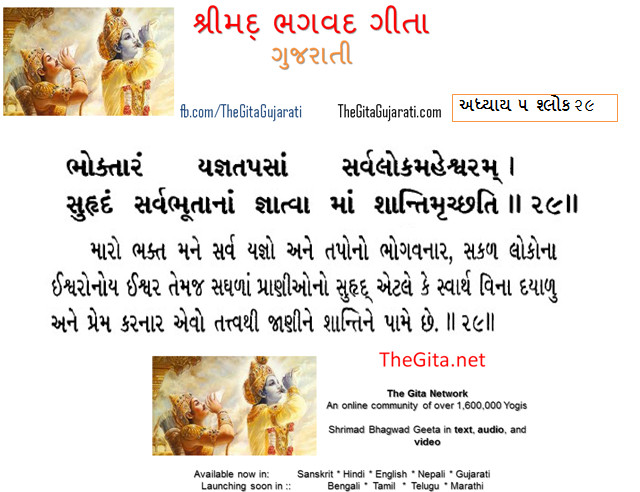TheGita Gujarati – Chapter – 5
Chapter – 5 – Shloka – 1
Arjuna asked the Great Lord:
Dear Krishna, I am still confused. I have heard praise of Yoga as well as of Sannyaas (Holy Pilgrimage), from You. Which one of these two O Lord, is the best path for me?
अर्जुन बोले —- कृष्ण ! आप कर्मों के संन्यास की और फिर कर्मयोग की प्रशंसा करते हैं । इसलिये इन दोनों में से जो एक मेरे लिये भली भाँति निश्चित कल्याण कारक साधन हो, उस को कहिये ।। १ ।।
Chapter – 5 – Shloka – 2
Oh Arjuna, both the paths of Yoga and Sannyaas lead one to supreme bliss and happiness. However, I shall always regard Yoga as the better path to the attainment of supreme peace and unity with Me, than the path of Sannyaas.
श्रीभगवान् बोले —- कर्म संन्यास और कर्म योग —- ये दोनों ही परम कल्याण के करने वाले हैं, परन्तु उन दोनों में भी संन्यास से कर्म योग साधन में सुगम होने से श्रेष्ठ है ।। २ ।।
Oh Arjuna a true Sannyaasi is one who has no doubts about anything he does or encounters in his life; who has no enemies whatsoever, and above all, who is free from all desires (for material objects). If he has accomplished all these bondages of the world.
हे अर्जुन ! जो पुरुष न किसी से द्बेष करता है और न किसी की आकांक्षा करता है, वह कर्मयोगी सदा संन्यासी ही समझने योग्य है ; क्योंकि राग-द्बेषादि द्बन्द्बों से रहित पुरुष सुख पूर्वक संसार बन्धन से मुक्त्त हो जाता है ।। ३ ।।
Oh Arjuna, in essense, Yoga and Sannyaas are the same because both of these achieve the same goal. Those who consider Yoga and Sannyaas as two different paths leading to the achievement of two different goals, are ignorant.
When one is fully absorbed and established in either one of Yoga or Sannyaas, he achieves the results of both of these sacred institutions.
उपर्युक्त्त संन्यास और कर्मयोग को मूर्ख लोग पृथक्-पृथक् फल देने वाले कहते हैं न कि पण्डितजन ; क्योंकि दोनों में से एक में भी सम्यक् प्रकार से स्थित पुरुष दोनों के फलरूप परमात्मा को प्राप्त होता है ।। ४ ।।
Yoga or Sannyaas (together known as Sankyoga) both attain the same goal for he who follows either of these paths. Only he who considers Yoga and Sannyaas as one, sees the ultimate Truth (the Lord).
ज्ञान योगियों द्वारा जो परम धाम प्राप्त किया जाता है, कर्मयोगियों द्वारा भी वही प्राप्त किया जाता है । इसलिये जो पुरुष ज्ञान योग और कर्म योग को फलरूप में एक देखता है, वही यथार्थ देखता है ।। ५ ।।
The Blessed Lord spoke in His Divine voice:
O my dear Arjuna, in order for one to achieve Sannyaas, he must practise Karmyoga (doing Karma or actions without attachment or desire to see the results of those actions). If one is successful in performing Karmyoga (that is Karma without attachment to results), he shall realize God very quickly.
परन्तु हे अर्जुन ! कर्मयोग के बिना संन्यास अर्थात् मन, इन्द्रिय और शरीर द्वारा होने वाले सम्पूर्ण कर्मों में कर्तापन का त्याग प्राप्त होना कठिन है और भगवत्स्वरूप को मनन करने वाला कर्म योगी पर ब्रह्म परमात्मा को शीघ्र ही प्राप्त हो जाता है ।। ६ ।।
The Lord spoke onwards:
The Karmyogi is a purified being who has conquered the self. He does not centre his life around himeself but around the achievement of being one with God.
He detaches himeself from his senses, centering all his thoughts on God and achieving everlasting peace and happiness by breaking free of all material bondage to the world.
जिसका मन अपने वश में है, जो जितेन्द्रिय एवं विशुद्भ अन्त:करण वाला है और सम्पूर्ण प्राणियों का आत्मरूप परमात्मा ही जिसका आत्मा है, ऐसा कर्म योगी कर्म करता हुआ भी लिप्त नहीं होता ।। ७ ।।
He who comes to the realization that, although he is physically performing actions such as seeing, hearing, touching, smelling, eating, walking, sleeping, breathing, speaking, receiving, sacrificing, opening and closing eyes, and so on, that he is actually doing nothing, is a Yogi. O Arjuna, the truly wise Yogi knows that in reality, only the senses are acting among their sense objects.
तत्त्व को जानने वाला सांख्य योगी तो देखता हुआ, सुनता हुआ, स्पर्श करता हुआ ; सूंघता हुआ, भोजन करता हुआ, गमन करता हुआ, सोता हुआ, श्वास लेता हुआ, बोलता हुआ, त्यागता हुआ, ग्रहण करता हुआ तथा आँखों को खोलता और मूंदता हुआ भी, सब इन्द्रियां अपने-अपने अर्थों में बरत रही हैं —- इस प्रकार समझ कर नि:संदेह ऐसा माने कि मैं कुछ भी नहीं करता हूँ ।। ८ – ९ ।।
The Lord declared:
One who leaves all the results of his actions to God and performs Karma without attachment, is immune to all sins of the world in the same way as a lotus leaf remains unmoistened when placed in water.
जो पुरुष सब कर्मों को परमात्मा में अर्पण करके और आसक्त्ति को त्याग कर कर्म करता है, वह पुरुष जल से कमल पत्ते की भाँति पाप से लिप्त नहीं होता ।। १० ।।
O Arjuna, Yogis purify their souls by abolishing any feelings of attachment within themselves by performing Karma through mind, body, intellect, and senses.
कर्मयोगी ममत्व बुद्भि रहित केवल इन्द्रिय, मन, बुद्भि और शरीर द्वारा भी आसक्त्ति को त्याग कर अन्त:करण की शुद्भि के लिये कर्म करते हैं ।। ११ ।।
When a Yogi has reached a state of true self-realization by leaving all fruits and results of Karma in the hands of the Lord, he achieves true peace and happiness.
However, he who does Karma (actions) for a selfish motive and for the attainment of fruits of his actions, never becomes free of the bondages of desire for material pleasures.
कर्म योगी कर्म के फल का त्याग करके भगवत्प्राप्ति रूप शान्ति को प्राप्त होता है और सकाम पुरुष कामना की प्रेरणा से फल में आसक्त्त होकर बँधता है ।। १२ ।।
A person, having self-control, and mentally freeing himself of all actions (by the uninterest in results of actions), in really performs no actions whatsoever. By mentally detaching himself of all Karma, a man may live in true bliss and peace in his body of nine openings.
अन्त:करण जिसके वश में है, ऐसा सांख्य योग का आचरण करने वाला पुरुष न करता हुआ और न करवाता हुआ ही नव द्वारों वाले शरीर रुप घर में सब कर्मों को मन से त्याग कर आनन्द पूर्वक सच्चिदानन्दधन परमात्मा के स्वरूप में स्थित रहता है ।। १३ ।।
The Lord does not create the performance of actions (or Karma ), nor Karma itself, nor even the result of Karma. It is simply all due to nature performing its function in the world.(However, nature derives its motivation power from God.)
परमेश्वर मनुष्यों के न तो कर्तापन की, न कर्मों की और न कर्म फल के संयोग की ही रचना करते हैं, किंतु स्वभाव ही बर्त रहा है ।। १४ ।।
I, the all pervading Lord receives neither the good nor the bad Karma of anyone. People are from time to time deluded because their Knowledge (Gyan) is Covered up or blinded by ignorance (Agyan).
सर्वव्यापी परमेश्वर भी न किसी के पाप कर्म को और न किसी के शुभ कर्म को ही ग्रहण करता है, किंतु अज्ञान के द्वारा ज्ञान ढका हुआ है, उसी से सब अज्ञानी मनुष्य मोहित हो रहे हैं ।। १५ ।।
The Lord continued:
People’s achievement of knowledge of their SELF has allowed them to destroy their ignorance or remove their lack of knowledge (Agyan). They soon find that the knowledge they acquire radiates the light of God within them.
परन्तु जिनका वह अज्ञान परमात्मा के तत्त्व ज्ञान द्वारा नष्ट कर दिया गया है, उनका वह ज्ञान सूर्य के सदृश उस सच्चिदानन्दधन परमात्मा को प्रकाशित कर देता है ।। १६ ।।
The Lord spoke:
O Arjuna, total liberation and everlasting peace is achieved only by those whose mind and intellect constantly dwells on God and who have destroyed all sin by achieving Gyan (Knowledge)
जिनका मन तद्रू प हो रहा है, जिनकी बुद्भि तद्रू प हो रही है और सच्चिदानन्दधन परमात्मा में ही जिनकी निरन्तर एकीभाव से स्थिति है, ऐसे तत्परायण पुरुष ज्ञान के द्वारा पाप रहित होकर अपुनरावृति को अर्थात् परम गति को प्राप्त होते हैं ।। १७ ।।
The wise men treat everybody as equals O Arjuna, whether it be a learned and cultured Brahman, a cow, an elephant, or a dog and an outcaste. He not differentiate between anybody.
वे ज्ञानी जन विद्या और विनय युक्त्त ब्राह्मण में तथा गौ, हाथी, कुत्ते और चाण्डाल में भी समदर्शी ही होते हैं ।। १८ ।।
O Arjuna, those who are even-minded and treat everybody as equals in all respects, have reached the ultimate goal of life and have conquered the whole world because God is perfect, without defect, and makes no distinction also. Therefore, they are,in reality, one with God.
जिनका मन सम भाव में स्थित है, उनके द्वारा इस जीवित अवस्था में ही सम्पूर्ण संसार जीत लिया गया है ; क्योंकि सच्चिदानन्दधन परमात्मा निर्दोष और सम है, इससे सच्चिदानन्दधन परमात्मा में ही स्थित हैं ।। १९ ।।
One truly becomes established in God when neither good circumstances make him happy, no bad Circumstance make him miserable. When a person reaches this type of balance in intellect and emotion, without a single doubt, with true knowledge of God, becomes eternally fixed in Him.
जो पुरुष प्रिय को प्राप्त होकर हर्षित नहीं हो और अप्रिय को प्राप्त होकर उद्भिग्न न हो, वह स्थिर बुद्भि संशय रहित ब्रह्म वेत्ता पुरुष सच्चिदानन्दधन परब्रह्म परमात्मा में एकीभाव से नित्य स्थिति है ।। २० ।।
O Arjuna, a person who has totally detached himself from the material world and is happy and satisfied within his own self, attains eternal peace. When a person is truly established in the Yoga of God (service, devotion and prayers to Him), he experiences true, eternal bliss without a doubt, O Arjuna.
बाहर के विषयों में आसक्त्ति रहित अन्त:करण वाला साधक आत्मा में स्थित जो ध्यान जनित सात्त्विक आनन्द है, उसको प्राप्त होता है ; तदनन्तर वह सच्चिदानन्दधन परब्रह्म परमात्मा के ध्यान रूप योग में अभिन्न भाव से स्थित पुरुष अक्षय आनन्द का अनुभव करता है ।। २१ ।।
When one’s senses make contact with sensual, material goods, Arjuna, these desire-evoking objects are the cause of misery (these objects may appear enjoyable to material pleasure-seekers).
These enjoyments are temporary, having a beginning and an end. When one develops a habitual desire for these artificial enjoyments. O Arjuna, he falls into deep misery and irrational behaviour as soon as these pleasures have disappeared from him.
Thus, O son of Kunti, do not get involved with these temporary pleasures if you wish to avoid misery.
जो ये इन्द्रिय तथा विषयों के संयोग से उत्पन्न होने वाले सब भोग हैं, यद्यपि विषयी पुरुषों को सुख रूप भासते हैं तो भी दुःख के ही हेतु हैं और आदि अन्त वाले अर्थात् अनित्य हैं । इसलिये हे अर्जुन ! बुद्भिमान विवेकी पुरुष उनमें नहीं रमता ।। २२ ।।
A person who has learnt to withstand the forces of desire and anger brought on by material pleasures, before he leaves his body, is a true Yogi who is happy and in a mentally and physically peaceful state with himself forever.
जो साधक इस मनुष्य शरीर से, शरीर का नाश होने से पहले-पहले ही काम क्रोध से उत्पन्न होने वाले वेग को सहन करने में समर्थ हो जाता है, वही पुरुष योगी है और वही सुखी है ।। २३ ।।
One who is truly happy, peaceful and enlightened with his Soul, that wise man (Yogi) has combined with the supreme Soul (God) as one and attains freedom from all bondages to the world.
जो पुरुष अन्तरात्मा में ही सुख वाला है, आत्मा में ही रमण करने वाला है तथा जो आत्मा में हीं ज्ञान वाला है, वह सच्चिदानन्दधन परब्रह्म परमात्मा के साथ एकीभाव को प्राप्त सांख्य योगी शान्त ब्रह्म को प्राप्त होता है ।। २४ ।।
Those wise men or sages who have abolished and destroyed all their sins with the achievement of true Gyan (Knowledge), and who have devoted themselves to the welfare of other beings, attain supreme and eternal peace.
जिनके सब पाप नष्ट हो गये हैं, जिनके सब संशय ज्ञान के द्वारा निवृत हो गये हैं, जो सम्पूर्ण प्राणियों के हित में रत हैं और जिनका जीता हुआ मन निश्चल भाव से परमात्मा में स्थित है, वे ब्रह्मवेत्ता पुरुष शान्त ब्रह्म को प्राप्त होते हैं ।। २५ ।।
O Arjuna, all of those wise men (Yogis) who have learned to control their minds, have learned to conquer and abolish all of the desires and anger within them, and have truly realized God, attain freedom and liberation from worldly ties in all respects.
काम क्रोध से रहित, जीते हुए चित्त वाले परब्रह्म परमात्मा का साक्षात्कार किये हुए ज्ञानी पुरुषों के लिये सब ओर से शान्त परब्रह्म परमात्मा ही परिपूर्ण हैं ।। २६ ।।
person who has totally detached himself from sense objects that give temporary pleasure and enjoyment, he who has learned to control and equalize the number of breaths going outwards and inwards through the nostrils, he who has brought his senses, mind and intellect under full control, and he who is desire less fearless and without anger, is always a free and liberated wise man.
बाहर के विषय भोगों को न चिन्तन करता हुआ बाहर ही निकाल कर और नेत्रों की दृष्टि को भृकुटी के बीच में स्थित करके तथा नासिका में विचरने वाले प्राण और अपान वायु को सम करके जिसकी इन्द्रियाँ, मन और बुद्भि जीती हुई हैं, ऐसा जो मोक्ष परायण मुनि इच्छा, भय और क्रोध से रहित हो गया है, वह सदा मुक्त्त ही है ।। २७ – २८ ।।
The Lord declared:
O Arjuna, he who shall consider ME the enjoyer of sacrifices and all that is internally pure, and who is devoted to ME, the God of all worlds and well-wisher of all beings, attains true, everlasting peace.
मेरा भक्त्त मुझको सब यज्ञ और तपों का भोगने वाला, सम्पूर्ण लोकों के ईश्वरों का भी ईश्वर तथा सम्पूर्ण भूत प्राणियों का सुह्रद् अर्थात् स्वार्थ रहित दयालु और प्रेमी, ऐसा तत्त्व से जान कर शान्ति को प्राप्त होता है ।। २९ ।।
Continue Read – Chapter – 6
